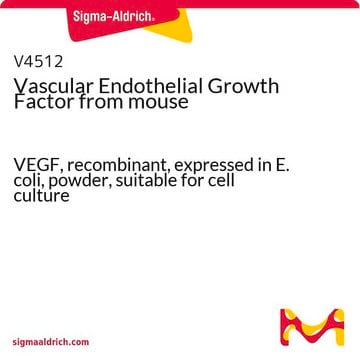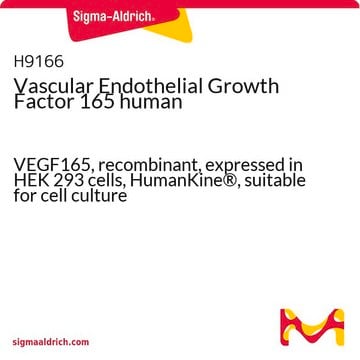GF315
VEGF165 Protein, Human Recombinant Animal Free
The Vascular endothelial growth factor (VEGF or VEGFA) is a potent mediator of both angiogenesis & vasculogenesis in the fetus & adult. Manufactured using all non-animal reagents.
Sinónimos:
Vascular Endothelial Growth Factor 165, VEGF-165, VEGF, Vascular Endothelial Growth Factor, VEGF-A
Iniciar sesiónpara Ver la Fijación de precios por contrato y de la organización
About This Item
UNSPSC Code:
12352202
eCl@ss:
32160405
NACRES:
NA.77
Productos recomendados
Quality Level
assay
>98% (SDS-PAGE and HPLC)
impurities
<0.1 μg/mg protein endotoxin (<1EU/μg)
NCBI accession no.
UniProt accession no.
shipped in
dry ice
Categorías relacionadas
General description
Product Source: E. coli
Vascular endothelial growth factor (VEGF or VEGFA) is a potent mediator of both angiogenesis and vasculogenesis in the fetus and adult. Humans express alternately spliced isoforms of 121, 145, 165, 183, 189, and 206 amino acids (aa) in length. VEGF165 appears to be the most abundant and potent isoform, followed by VEGF121 and VEGF189. VEGF is a potent growth and angiogenic cytokine. It stimulates proliferation and survival of endothelial cells, and promotes angiogenesis and vascular permeability. Expressed in vascularized tissues, VEGF plays a prominent role in normal and pathological angiogenesis. Substantial evidence implicates VEGF in the induction of tumor metastasis and intra-ocular neovascular syndromes. VEGF signals through the three receptors; fms-like tyrosine kinase (flt-1), KDR gene product (the murine homolog of KDR is the flk-1 gene product) and the flt4 gene product. Recombinant human VEGF is a 38.2 kDa disulfide-linked homodimeric protein consisting of two 165 amino acid polypeptide chains.
Specificity
Cross Reactivty
Mouse, Rat, Pig, Hamster, Trout, Green Algae, Sheep, Cow, Rabbit, Guinea Pig
Mouse, Rat, Pig, Hamster, Trout, Green Algae, Sheep, Cow, Rabbit, Guinea Pig
Application
Research Category
Stem Cell Research
Stem Cell Research
Research Sub Category
Growth Factors & Receptors
Growth Factors & Receptors
Quality
Bioactivity assay: Determined by the dose-dependent stimulation of the proliferation of human umbilical vein endothelial cells (HUVEC) using a concentration range of 1.0-8.0 ng/ml.
Physical form
Product is filtered through a 0.2 micron filter before lyophilization.
Recombinant animal free human VEGF165 is manufactured using all non-animal reagents
Storage and Stability
Store at -20°C for up to 6 months from date of receipt.
Disclaimer
Unless otherwise stated in our catalog or other company documentation accompanying the product(s), our products are intended for research use only and are not to be used for any other purpose, which includes but is not limited to, unauthorized commercial uses, in vitro diagnostic uses, ex vivo or in vivo therapeutic uses or any type of consumption or application to humans or animals.
Storage Class
11 - Combustible Solids
wgk_germany
WGK 1
flash_point_f
Not applicable
flash_point_c
Not applicable
Certificados de análisis (COA)
Busque Certificados de análisis (COA) introduciendo el número de lote del producto. Los números de lote se encuentran en la etiqueta del producto después de las palabras «Lot» o «Batch»
¿Ya tiene este producto?
Encuentre la documentación para los productos que ha comprado recientemente en la Biblioteca de documentos.
John P Morgan et al.
Nature protocols, 8(9), 1820-1836 (2013-08-31)
This protocol describes how to form a 3D cell culture with explicit, endothelialized microvessels. The approach leads to fully enclosed, perfusable vessels in a bioremodelable hydrogel (type I collagen). The protocol uses microfabrication to enable user-defined geometries of the vascular
Wutigri Nimlamool et al.
Molecular biology of the cell, 26(15), 2755-2768 (2015-06-13)
Gap junctions (GJs) exhibit a complex modus of assembly and degradation to maintain balanced intercellular communication (GJIC). Several growth factors, including vascular endothelial growth factor (VEGF), have been reported to disrupt cell-cell junctions and abolish GJIC. VEGF directly stimulates VEGF-receptor
Nuestro equipo de científicos tiene experiencia en todas las áreas de investigación: Ciencias de la vida, Ciencia de los materiales, Síntesis química, Cromatografía, Analítica y muchas otras.
Póngase en contacto con el Servicio técnico






